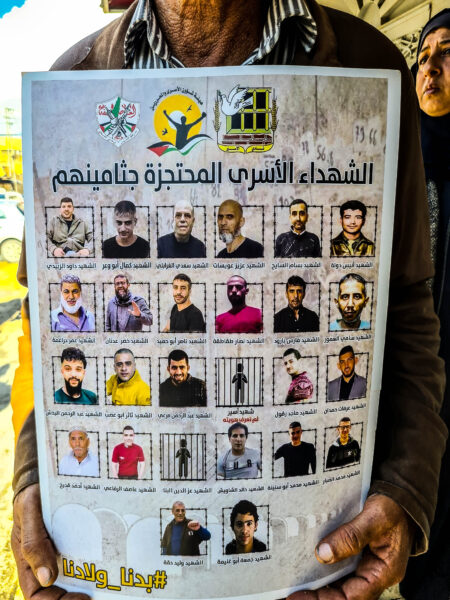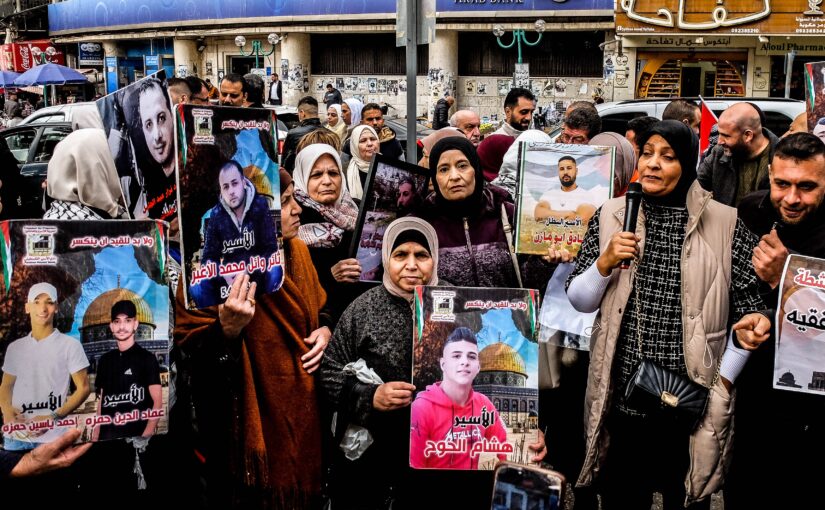On Monday 25 November, about eighty women, mothers, sisters and wives, gathered in Nablus, in the West Bank, to demonstrate in solidarity with the nearly 100 women detained in Israeli jails, along with around 12,000 men, to demand their release and an end to the ongoing genocide in Gaza. Their family members have been in Israeli jails for months or years, yet nothing has been heard from them since 7 October last year.
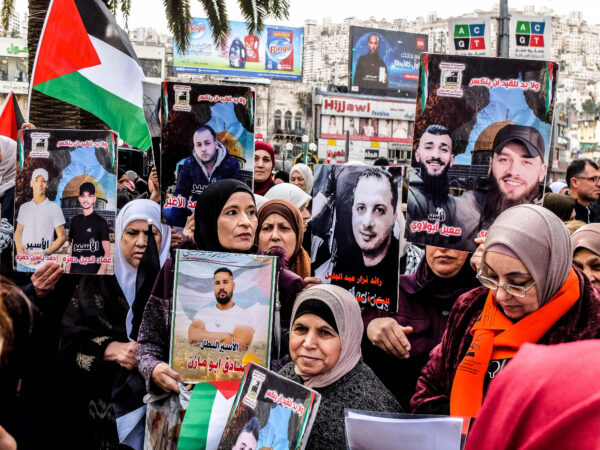
“We want to live in a free country! Out with the occupation forces! They burn Gaza with phosphorus bombs, and tomorrow it’s our turn,” they chanted in one of the city’s main squares while clutching pictures of their loved ones imprisoned.
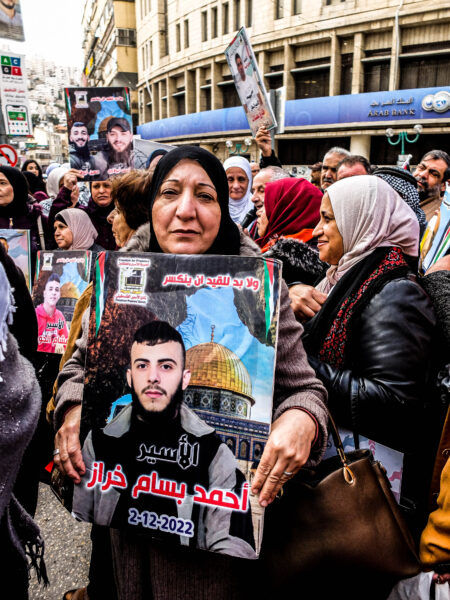
And again: “We will not tire; they are the occupiers and the criminals. They kill the children of Palestine, men and women rise up against this.”
“My son has been in prison for two and a half years,” says Hanan, holding a photo of a smiling young man in his 30s. She has not heard from him for more than a year. “The situation in prison is very bad now,” she says. “We don’t know anything anymore because we have no chance to communicate with them in any way. No institution, red cross or human rights association, no lawyer can reach them to tell us how they are. We are very worried about our sons.” She adds: “I hope my voice will reach the whole world, and that someone will help us.”
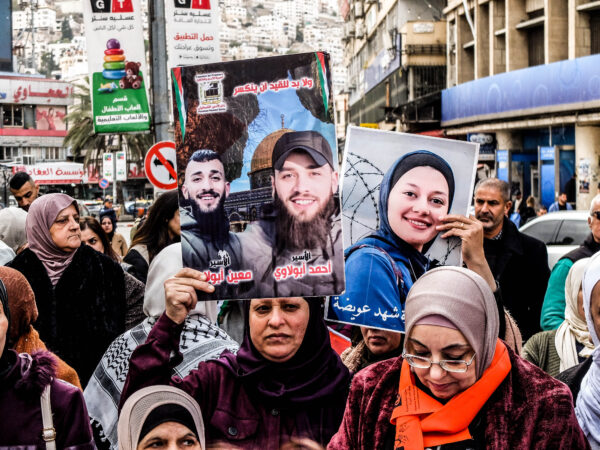
There are a many, too many stories. Their families brave the risks of arrest and detention to take to the streets, sometimes weekly, to demand the release of their loved ones and demand news.
“My son Samir has been in prison for eight months in administrative detention,” says another woman, a photo of the young man in her arms. “Every time his detention period ends, they renew it for him. The Israeli administration refuses permission to the lawyer and anyone else to visit him. We only hear from him when someone is released from of the same prison.
“My son is sick, and he has no treatment. They don’t give him medicine. They don’t send people for treatment.”
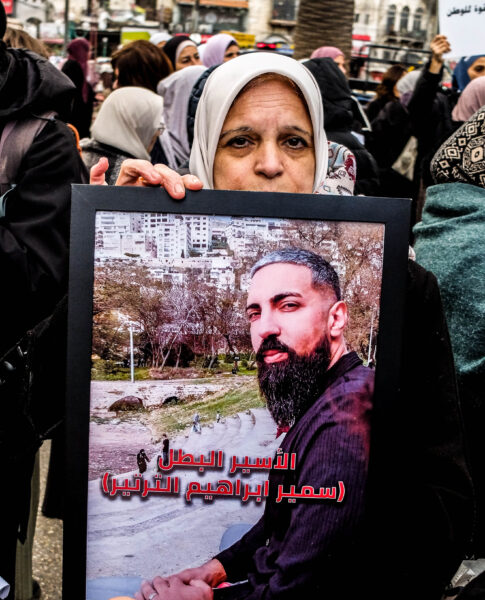
Also in Tulkarem, where every Tuesday dozens of people gather outside the headquarters of the International Red Cross in the hope that their voices will be heard outside the country. A band of young boys with drums and musical instruments set the rhythm for the chants, while family members and representatives of local human rights associations pass the microphone around. “With soul and blood, we will defend our prisoners! Raise your voice for those who have sacrificed their freedom,” they shout together.
“Conditions in prisons since October 7 are completely different. The number of prisoners has more than doubled,” says Ibrahim Nemer, one of the representatives of the Palestinian Prisoners Club of Tulkarem. “There are more than 12,00 political prisoners in jails now.”
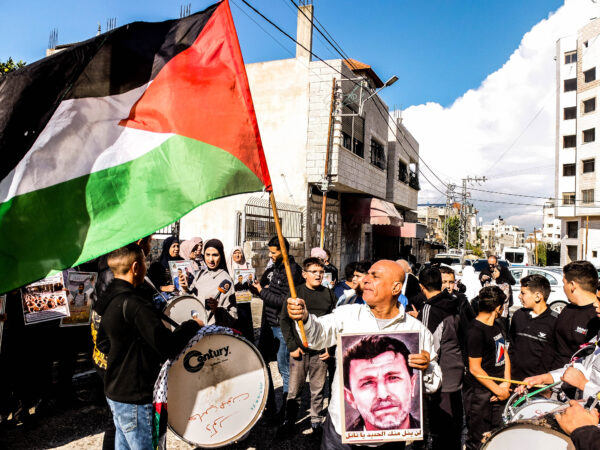
According to Addameer, leading Palestinian human rights organisation on prisoners rights, before Oct. 7 there were 5,000 political prisoners. The number of administrative detentions has also increased tremendously. There are almost 3,400 people in administrative detention, whereas before it was 1,200.
Administrative detention means that a suspect is arrested and held in jail potentially indefinitely, without being told the reasons for the arrest and without the Israeli authorities being required to present evidence against him. Thus, with no possibility of defence.
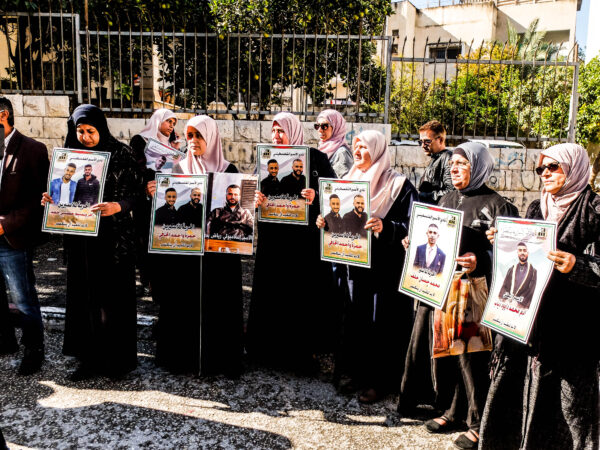
“There are no longer humane living conditions in the prisons. Everything that the prisoners’ movement had conquered has been taken away,” Ibrahim continues. “TV, books, and there are no more visits for relatives. They don’t give enough food or water … Most of the prisoners have lost dozens of pounds.”
Prisoners are forced to keep the same clothes for weeks, and despite the cold they are not given the necessary blankets. Even shampoo and soap are not provided.
“It’s torture. There is no other way to describe it.”
Ibrahim describes horrific conditions in Israeli jails over the last year. “Most of the prisoners have scabies. They used to go outside two hours a day, now no outside hours are allowed in most prisons. Obviously, this is contrary to human rights.”
A further problem is their legal status. The West Bank has been occupied by the Israeli army since 1967. This would make its detainees prisoners of war, or political prisoners. “Instead, Israel does not recognize this status, but considers them common prisoners, delinquents. If it considered them political prisoners, or prisoners of war, it would have to treat them differently in accordance with international law,” explains Ibrahim.
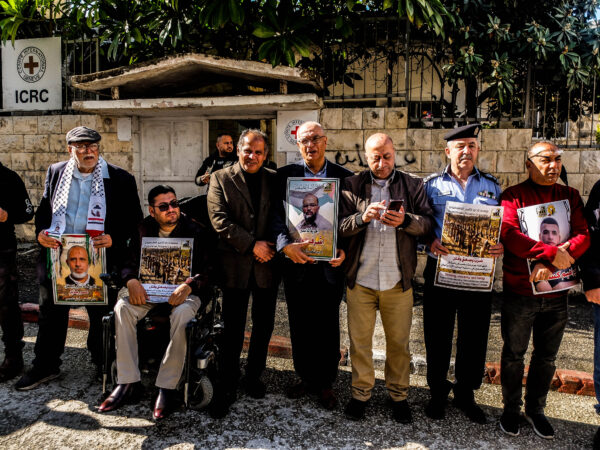
“The military is always invading the cells where they are detained with dogs, beating them. Many prisoners have been killed in prison, the number has increased a lot since October 7, many have died because of torture and the absence of medical care. The conditions are not conducive to life … so that prisoners are just thinking about how to survive …”
According to the Palestinian Prisoner’s Society, at least forty prisoners have died in Israeli custody since Oct. 7. But it could be many more. At least 25 bodies have not yet been returned to their families.
“We are back to the prison-system of hundreds of years ago. We know that many people internationally are with us, but that is not enough. Because all governments are supporting Israel with weapons, money, and even soldiers. We need to put more pressure on governments to stop aid and support for Israel and free all political prisoners who are being held,” continues Ibrahim.
He has two sons in prison, and a brother. One son with a one-year sentence; one with a three-year sentence. And the brother with a 21-year prison sentence.
“We are like everyone, yani, like all Palestinian families … but the difficult conditions the prisoners are suffering make families worry about the very lives of their loved ones in prison. The problem is not only that they are detained and the time they have to wait for them to be released, but today every day we fear for their lives.”
